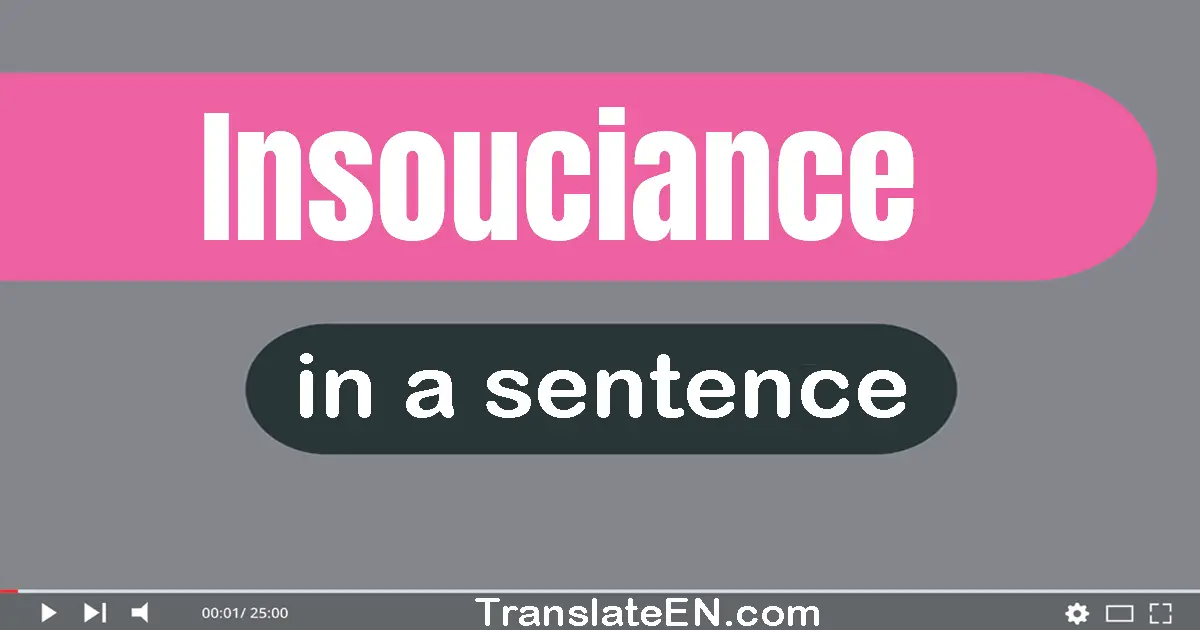Insouciance in a sentence
Synonym: carelessness, nonchalance. Antonym: concern
Meaning: Casual lack of concern; significant in discussions of attitude.

(1) His insouciance towards his finances left him in debt.
(2) She walked through the crowd with an air of insouciance.
(3) His insouciance towards his responsibilities was concerning.
(4) She faced the difficult situation with insouciance and grace.
(5) His insouciance towards his health led to serious consequences.
(6) The insouciance with which she handled criticism was impressive.
(7) The politician's insouciance towards the environment was alarming.
(8) His insouciance towards the pandemic guidelines was irresponsible.
(9) The athlete's insouciance towards training led to poor performance.
(10) The insouciance of the driver as he sped down the highway was reckless.
Insouciance sentence
(11) His insouciance towards his safety was evident in his daredevil stunts.
(12) His insouciance in the face of danger was both admirable and concerning.
(13) The insouciance of the teenager towards his studies worried his parents.
(14) The carefree insouciance of the children playing in the park was contagious.
(15) The insouciance of the young couple as they traveled the world was enviable.
(16) His insouciance towards his financial situation eventually caught up with him.
(17) His insouciance towards his responsibilities was frustrating to his colleagues.
(18) The insouciance of the child as he explored the world around him was endearing.
(19) She approached the job interview with insouciance, not realizing its importance.
(20) His insouciance towards his health was evident in his unhealthy lifestyle choices.
Insouciance make sentence
(21) The insouciance of the cat as it lazily stretched in the sun was a sight to behold.
(22) The insouciance of the student towards his studies was reflected in his poor grades.
(23) The CEO's insouciance towards employee satisfaction resulted in high turnover rates.
(24) The insouciance of the politician towards the concerns of the people was infuriating.
(25) The insouciance of the puppy as it played in the park brought joy to all who watched.
(26) The insouciance of the toddler as he explored the room brought a smile to everyone's face.
(27) The insouciance of the puppy as it played in the garden brought a smile to everyone's face.
(28) His insouciance towards the consequences of his actions was concerning to those around him.
(29) The artist's insouciance towards societal norms was reflected in his unconventional artwork.
(30) She displayed an insouciance towards the safety regulations, putting herself and others at risk.
(31) The insouciance of the couple as they planned their wedding was evident in their relaxed demeanor.
(32) The insouciance of the artist towards societal expectations was reflected in his unconventional artwork.
Insouciance meaning
Insouciance is a word that is not commonly used in everyday conversation, but it is a word that can add depth and sophistication to your writing. Insouciance is defined as a lack of concern or care, a feeling of nonchalance or indifference. It is a word that can be used to describe a person's attitude or behavior, or it can be used to describe a situation or event. If you are looking to incorporate insouciance into your writing, there are a few tips that can help you use the word effectively. Here are some tips for how to use insouciance in a sentence:
1. Use insouciance to describe a person's attitude or behavior. Insouciance is often used to describe a person who is carefree, relaxed, and unconcerned.
For example, you might say, "She walked into the room with an air of insouciance, as if she didn't have a care in the world." This sentence describes the person's attitude and demeanor, using insouciance to convey a sense of nonchalance and indifference.
2. Use insouciance to describe a situation or event. Insouciance can also be used to describe a situation or event that is characterized by a lack of concern or care.
For example, you might say, "The party was marked by an insouciance that bordered on recklessness." This sentence describes the overall atmosphere of the party, using insouciance to convey a sense of carelessness and indifference.
3. Use insouciance in a more formal or literary context. Insouciance is a word that is often used in more formal or literary contexts, such as in novels, poetry, or academic writing. If you are writing in a more formal or literary style, using insouciance can help to elevate your writing and add a sense of sophistication.
For example, you might say, "The protagonist's insouciance in the face of danger was both admirable and unsettling." This sentence uses insouciance to describe a character's attitude, while also conveying a sense of tension and conflict.
4. Use insouciance sparingly. While insouciance can be a useful word to add to your writing, it is important to use it sparingly. Overusing insouciance can make your writing sound repetitive or pretentious. Instead, try to use insouciance only when it adds something meaningful to your writing, and use other words to describe similar concepts when appropriate.
In conclusion, insouciance is a word that can add depth and sophistication to your writing. By using insouciance to describe a person's attitude or behavior, a situation or event, or in a more formal or literary context, you can convey a sense of nonchalance and indifference that can help to elevate your writing. However, it is important to use insouciance sparingly and only when it adds something meaningful to your writing.
The word usage examples above have been gathered from various sources to reflect current and historical usage of the word Insouciance. They do not represent the opinions of TranslateEN.com.
